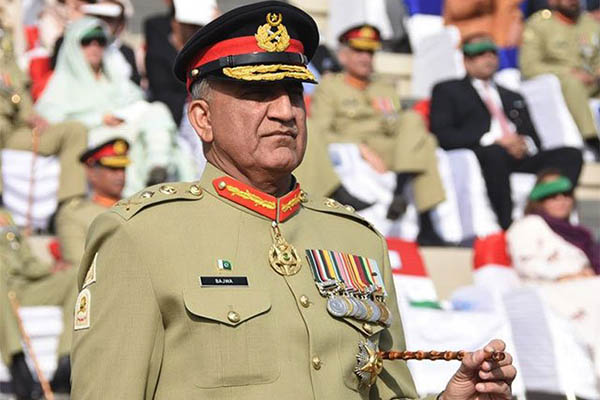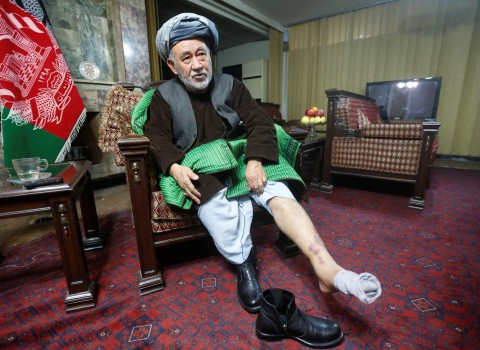Newsweek Pakistan
BENAZIR SHAH

At dusk on Nov. 26 in Rawalpindi, Qamar Javed Bajwa, his wife, Ayesha, and sons, Saad and Ali, were at the graves of Bajwa’s mother and mother-in-law when the call came. The Prime Minister wanted a meeting with the 56-year-old lieutenant-general. The family soon left the cemetery for their home—upon which friends and strangers alike had already descended with an unsaid anticipation. His family tended to the surprise visitors; the general changed into his uniform and made his way to the Prime Minister’s residence in Islamabad.
“And that was that,” Saad, 27, tells Newsweek. The news broke quickly. His father, a dark horse candidate for the job, ranking fourth in seniority and with little appetite for the limelight, had officially been named Chief of Army Staff-designate. Three days later, he became the 16th man to lead the Pakistan Army, the world’s sixth largest. “Every Army chief has had his own legacy or way of doing things,” says Saad, who is a barrister in Islamabad, “our father believes in the supremacy of the Constitution. He always says he wants the Pakistan [that the] Quaid-e-Azam envisioned, a Pakistan where institutions are more important than individuals.”
Born Nov. 11, 1960, in Karachi, into an Army family, General Bajwa is the youngest of five siblings. He enlisted in 1978 and was commissioned two years later in the 16 Baloch Regiment. The career infantry officer has taken several military training courses and participated in army exercises in Canada and the U.S. He has commanded the Army’s X Corps in Rawalpindi, led the Force Command Northern Areas, and served as commandant of the Army’s School of Infantry and Tactics, Quetta. Like his predecessor, General Bajwa was inspector-general for training and evaluation at the Army’s General Headquarters, Rawalpindi, before taking the top post.
The general assumed office during yet another uptick in tensions with India, with almost daily reports of gunfire and shelling between Pakistani and Indian troops across the Line of Control and the Working Boundary that divide Kashmir. As commander of the X Corps, which is responsible for peace and security along this grim stretch, and with his past experience in the Northern Areas, General Bajwa is deeply familiar with the situation.
It also helps that Indian officers also respect him. In 2007, he was part of the U.N. peacekeeping mission in the Democratic Republic of Congo, where he worked with the man who would become India’s Army chief, Gen. Bikram Singh. The former Indian Army chief has described Bajwa as an “outstanding and professional solider.” The respect is mutual, says Ali, the new chief’s 25-year-old son who is a petroleum engineer. Bajwa found Singh to be “a very professional and fair commander.”
A wider historical perspective informs General Bajwa’s worldview. His library consists almost entirely of books on history, diplomacy, and politics. Both sons describe him as a voracious reader, a well-thumbed book always on his bedside table. “He has a keen interest in European history,” says Saad, “He also reads extensively about India. In fact, last month on his birthday, we gifted him a book each. One was on India, because we knew he would enjoy reading it.”
The reading habit apparently came later in life, says Saad. “We’ve been told he wasn’t the brightest student in school, but he excelled in military academics since his early days in the [Pakistan Military Academy]. He’s always had a tremendous capacity for hard work. And he prefers the ability to work hard over talent alone.”
The general enjoys cricket, both watching and playing it, and he particularly admires Viv Richards and Javed Miandad. He is also fond of Noor Jehan tunes, which he has crooned in the past, according to the sons. The one thing he cannot abide, they say, is irresponsibility.
Tackling extremism and terrorism, say his sons, will be the Army chief’s top responsibility. Earlier this month in Karachi, General Bajwa made it known through the military’s Inter-Services Public Relations wing that an all-out effort would be made to consolidate gains from the successful antiterrorism (and contentious anticorruption) operation in the megalopolis, and elsewhere, and that terrorism holdouts would be eliminated indiscriminately.
It was the Karachi Airport attack on June 8, 2014, that prompted military action through Operation Zarb-e-Azb, which gained even more public buy-in and dedication after the shocking slaughter of innocents at Peshawar’s Army Public School on Dec. 16, 2014. Saad remembers his father coming home that terrible evening, shaken. “He kept saying over and over, ‘This has to be the end. There must be consensus against terrorism; it is the biggest threat to Pakistan’s existence.’” General Bajwa has pictures of the schoolchildren slain in Peshawar framed in his office—a constant reminder of the battle he is determined to win.




